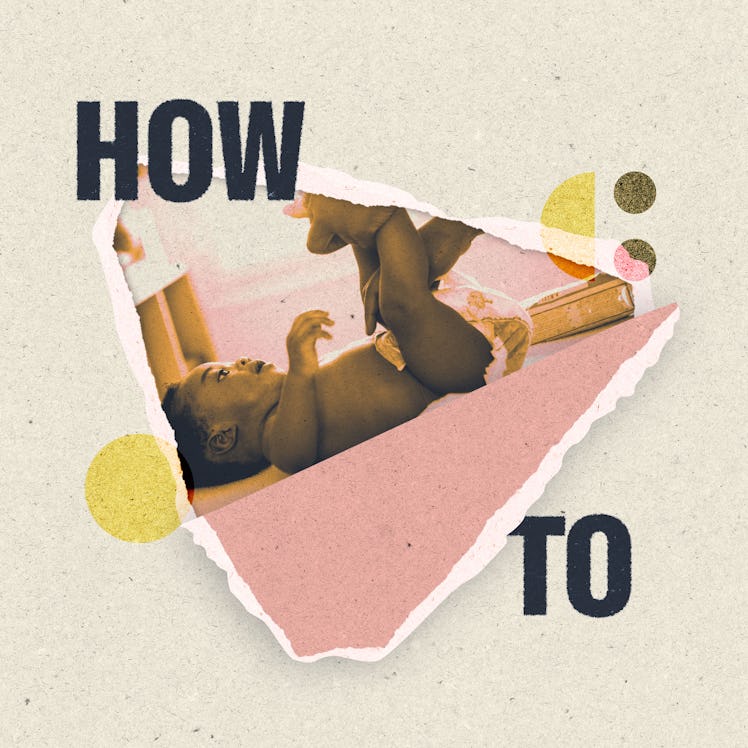How To Make A Baby Poop
So your newborn's diapers are a ghost town. Here's how to get things moving.

Learning how to make a baby poop easier is an important skill for new parents. Contrary to popular belief, not every newborn, infant, or baby poops perfectly after birth. Lifestyle changes, problems in feeding, a lack of gut flora, or sickness can cause your baby’s bowel movements to slow or become non-existent. But the fact that your baby isn’t instantly a perfect pooper doesn’t always mean there’s a problem. So while there are gentle and non-invasive ways to make a newborn poop, parents shouldn’t rush into it.
What Is Normal for Baby Poop?
Before parents can understand how to make a baby poop, they need to understand what constitutes “normal” stools.
“Infants who used to stool several times a day when they’re first born may slow down their production to just once every couple of days and that can be normal,” says Syeda Amna Husain, M.D., a pediatrician, internationally certified lactation consultant, and founder of Pure Direct Pediatrics. “The infant’s gut bacteria changes and matures as the infant grows older. These bacteria play an important part in the digestion process and are really one of the reasons that baby stool changes in a character over the first few months of life.”
For babies who are exclusively breast-fed, these changes can be even more extreme. Breastfed newborns may either poop after every feeding, save it all up for one bowel movement a day, or go days between producing a stool.
“What we as pediatricians care about is the consistency of the stool and if the infant is appearing to be any sort of discomfort,” Husain says.
Baby Constipation
In clear cases of baby constipation, Husain warns parents away from home remedies they might find in online forums. Additionally, she notes that a lack of bowel movements does not mean a child is dehydrated. In fact, the only fluids a baby should receive are breastmilk and formula. Parents should not offer water to babies younger than 6 months. If your baby is producing wet diapers but not stools, you can be sure dehydration is not the issue.
For a baby who is not pooping, Husain says that there are over-the-counter remedies that can be taken. “Occasionally, I will recommend a probiotic, but I like to see the child first and know of any associating factors along with a diet and stooling history.”
As babies get older and start on solid foods, a change in diet may also change the frequency of bowel movements. It’s not uncommon to see a decline in bowel movements, and parents may even see their child straining to pass a stool. This might cause their face to turn red, for instance, or result in grunts. If baby constipation or strain is an issue for a child eating solid food, it may be possible to get things moving by adding certain foods. “I recommend the ‘p-foods,’” says Husain. “That is, peaches, prunes, pears.”
Manual Methods to Get a Baby to Poop
Aside from probiotics and new food choices, there may also be manual ways to get things moving according to pediatrician Daniel Zoller, M.D., Medical Advisor to Green Active Family. And although he does caution that the methods aren’t evidence-based, that doesn’t mean they aren’t helpful.
“One of my personal favorites I call ‘bicycles,’” Zoller says. “Place the infant on their back on your thighs while you are sitting. Take their lower legs in each hand and move their legs around in a forward and backward circle, as if they were riding a bicycle. Do this for 10 minutes or so, and repeat several times per day. Make faces and talk or sing to your baby while you’re doing this! Most babies think it’s quite fun.”
Whatever method parents try to help their newborn poop, Zoller notes that it’s important for pediatricians to be involved in the process. There is a danger that babies might become dependent on ways to make them poop rather than developing and maintaining the skill themselves, therefore making the issue worse. That’s particularly true with the manual rectal stimulation technique.
“This can be dangerous, as babies can learn to depend on this in order to have a bowel movement,” Zoller says. “I would not recommend this unless specifically directed by your pediatrician.”
How to Make a Newborn Poop: A Quick Guide
- Avoid methods like manual rectal stimulation that can cause a baby to become dependent.
- Look for consistency in timing rather than time between baby poops to understand if your baby is actually having trouble.
- Try probiotics, but be sure to ask a pediatrician for guidance.
- If a baby is eating solids, add peaches, prunes, and pears.
This article was originally published on